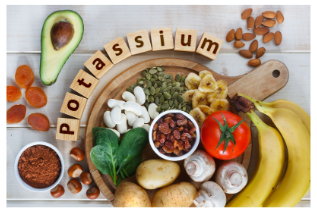Calcium, Minerals and Electrolytes
Calcium
Calcium is more than just a mineral—it’s essential for a wide array of bodily functions, from supporting bone health to facilitating muscle contraction and nerve transmission. This article explores the significance of calcium, its sources, deficiency symptoms, and natural ways to maintain optimal levels.

Functions of Calcium
Calcium plays several critical roles in the body:
- Bone and Dental Health: It provides strength and structure to bones and teeth, crucial for maintaining their integrity.
- Muscle Function: Calcium regulates muscle contractions by aiding in the release of neurotransmitters that stimulate muscle fibres.
- Nerve Transmission: It facilitates communication between nerve cells, allowing the release of neurotransmitters across synapses.
- Blood Clotting: Calcium is vital for the activation of clotting factors in the coagulation cascade, essential for wound healing and preventing excessive bleeding.
Signs of Calcium Deficiency
A lack of sufficient calcium intake can lead to various health issues, including:
- Osteoporosis: Weak and brittle bones that increase the risk of fractures, especially in older adults.
- Muscle Cramps: Due to impaired muscle function.
- Weakened Immune System: Calcium is essential for immune cell function.
- Dental Problems: Such as tooth decay and gum disease.
- Heart Problems: Calcium imbalance can affect heart rhythm and function.
- Depression: Calcium plays a role in neurotransmitter function, affecting mood regulation.
Rich Sources of Calcium
Ensuring adequate calcium intake is crucial. Here are some excellent dietary sources:
- Dairy Products: Milk, yogurt, and cheese are rich in calcium and highly bioavailable.
- Leafy Greens: Spinach, kale, and collard greens provide calcium along with other essential nutrients.
- Nuts and Seeds: Almonds, sesame seeds, and chia seeds are good sources of calcium.
- Fortified Foods: Plant-based milks, orange juice, and cereals fortified with calcium are options for vegans or those avoiding dairy.
Natural Ways to Maintain Calcium Levels
Incorporating these practices can help maintain optimal calcium levels:
- Sunlight Exposure: Stimulates vitamin D production in the skin, crucial for calcium absorption.
- Vitamin D: Facilitates the absorption of calcium from the diet, promoting bone health and overall calcium balance.
- Healthy Diet: Regularly consume calcium-rich foods to replenish calcium stores in the body.
By prioritising calcium-rich foods and supporting nutrients like vitamin D, individuals can enhance bone health, support muscle function, and maintain overall well-being. Whether through dairy products, leafy greens, or fortified options, integrating calcium into your diet ensures you reap the benefits of this vital mineral for years to come.
Magnesium
Magnesium is a vital mineral that plays a crucial role in numerous biochemical reactions within the body, essential for maintaining overall health and well-being. This article delves into the importance of magnesium, its functions, sources, deficiency symptoms, and natural ways to maintain optimal levels.

Functions of Magnesium
Magnesium is involved in a wide range of physiological functions:
- Energy Production: It serves as a cofactor for ATP synthesis, the body’s primary energy currency, supporting overall energy production.
- Muscle and Nerve Function: Magnesium regulates muscle contractions and helps transmit nerve impulses, crucial for smooth muscle function and proper nervous system operation.
- Bone Health: It aids in the absorption of calcium and plays a role in maintaining bone density, contributing to overall skeletal health.
Magnesium Deficiency
A deficiency in magnesium can lead to various health issues:
– Muscle Weakness: Impaired muscle function and weakness.
– Fatigue: Reduced energy levels and overall fatigue.
– Heart Arrhythmias: Irregular heart rhythms due to magnesium’s role in maintaining heart muscle function.
– Osteoporosis: Reduced bone density and increased risk of fractures.
Sources of Magnesium
Ensure adequate magnesium intake by incorporating these foods into your diet:
– Nuts: Almonds, cashews, and peanuts are excellent sources of magnesium.
– Seeds: Pumpkin seeds, sunflower seeds, and flaxseeds provide significant amounts of magnesium.
– Whole Grains: Brown rice, quinoa, and whole wheat are rich in magnesium.
– Leafy Greens: Spinach, kale, and Swiss chard offer magnesium along with other essential nutrients.
– Legumes: Beans, lentils, and chickpeas contain magnesium as well.
Natural Ways to Maintain Magnesium Levels
Support your magnesium levels naturally:
– Dietary Intake: Consume magnesium-rich foods regularly to replenish stores naturally.
– Epsom Salt Baths: Soaking in Epsom salt baths can aid in magnesium absorption through the skin, promoting relaxation.
– Supplementation: Consult a healthcare professional before considering magnesium supplements, especially for severe deficiencies or specific health needs.
Magnesium is indispensable for energy metabolism, muscle function, nerve transmission, and bone health. By including magnesium-rich foods in your diet and exploring natural supplementation options when necessary, you can ensure your body has the magnesium it needs to function optimally and maintain overall well-being. Prioritise your magnesium intake to support a healthy and active lifestyle.
Potassium
Potassium is an essential mineral and electrolyte that plays a pivotal role in numerous physiological processes crucial for overall health. This article explores the definition of potassium, its functions in the body, sources, symptoms of deficiency, and natural methods to maintain adequate levels.

Definition and Role of Potassium
Potassium functions as the primary positively charged ion (cation) inside cells, essential for maintaining cell function and overall body function. Its key roles include:
– Fluid Balance: Regulating fluid balance by balancing fluids inside and outside of cells.
– Muscle Function: Crucial for muscle contractions, including the cardiac muscle (heart) and skeletal muscles.
– Nerve Signal Transmission: Facilitating communication between nerve cells, ensuring proper nerve function.
Functions of Potassium
Potassium is integral to several bodily functions:
– Muscle Contractions: Essential for the contraction of both cardiac and skeletal muscles.
– Heart and Kidney Function: Supports the proper functioning of these vital organs.
– Nerve Signal Transmission: Facilitates the transmission of signals between nerve cells.
– Blood Pressure Regulation: Helps maintain normal blood pressure levels.
– Water Balance: Regulates fluid levels inside cells, contributing to overall hydration.
– Cellular Functions: Supports various cellular processes necessary for overall health.
Potassium Deficiency
A deficiency in potassium, known as hypokalemia, can lead to a range of symptoms:
– Muscle Weakness: Impaired muscle function and weakness.
– Fatigue: Reduced energy levels and overall tiredness.
– Heart Palpitations: Irregular heartbeats due to potassium’s role in cardiac function.
– High Blood Pressure: Potassium helps regulate blood pressure, and deficiency can contribute to hypertension.
– Severe Conditions: Extreme potassium deficiency may lead to irregular heart rhythms and, in severe cases, paralysis.
Rich Sources of Potassium
Ensure adequate potassium intake by incorporating these foods into your diet:
– Fruits: Bananas, avocados, oranges, and other fruits provide significant amounts of potassium.
– Vegetables: Potatoes (especially with the skin), spinach, kale, Swiss chard, and other leafy greens are rich sources.
– Beans: Kidney beans, black beans, lentils, and other legumes are high in potassium.
Natural Ways to Maintain Potassium Levels
Maintain optimal potassium levels naturally with these practices:
– Dietary Choices: Regularly consume potassium-rich foods to replenish levels naturally.
– Reduced Sodium Intake: Lowering sodium intake helps maintain a healthy electrolyte balance, including potassium.
– Hydration: Adequate water intake supports electrolyte balance, essential for maintaining potassium levels.
Potassium is indispensable for muscle function, nerve transmission, fluid balance, and overall body health. By prioritising potassium-rich foods and adopting healthy lifestyle habits, such as reducing sodium intake and staying hydrated, individuals can ensure their bodies have the potassium necessary for optimal function and well-being. Incorporate potassium into your daily diet to support a healthy and active lifestyle.
Zinc
Definition:
Zinc is an essential trace mineral crucial for numerous enzymatic processes and immune function.

Natural Resources:
– Found naturally in soil and water.
– Present in various foods derived from plants and animals.
Why Needed for the Body:
– Immune Support: Essential for immune system function and wound healing.
– Enzyme Activity: Supports over 300 enzymatic reactions in the body.
– Growth and Development: Necessary for growth, development, and DNA synthesis.
Rich Sources:
– Animal Sources: Beef, lamb, chicken, seafood (oysters, crab).
– Plant Sources: Legumes (chickpeas, lentils), nuts (cashews, almonds).
– Other Sources: Dairy products, whole grains.
Problems Due to Deficiency:
– Weakened Immunity: Increased susceptibility to infections.
– Delayed Wound Healing: Slower recovery from wounds and injuries.
– Growth Impairment: Particularly in children
Sodium
Definition:
Sodium is a crucial electrolyte and mineral that helps maintain fluid balance and supports nerve and muscle function in the body.

Problems Due to Deficiency:
– Hyponatremia (low blood sodium levels):
– Muscle cramps
– Fatigue and weakness
Why Needed for the Body:
– Regulates fluid balance
– Supports nerve function
– Essential for muscle contraction
Natural Resource:
– Found naturally in seawater
– Present in many fruits and vegetables
– Abundant in various mineral-rich salts
– Seafood like fish, Shellfish
Rich Sources:
– Table salt (sodium chloride)
– Processed foods (e.g., snacks, canned goods)
– Dairy products
– Seafood
Celtic Salt

Celtic salt contains 82 minerals beneficial for health. While not typically used for cooking, taking 2-3 granules daily before drinking water can help replenish essential nutrients, minerals, and electrolytes multiple times throughout the day.
Zinc and sodium are indispensable minerals crucial for various bodily functions, including immune support, enzyme activity, fluid balance, and nerve function. By incorporating zinc-rich foods like meats, legumes, and nuts, as well as sodium from natural sources and mineral-rich salts, individuals can maintain optimal health and support vital physiological processes. Prioritise a balanced diet to ensure adequate intake of these essential minerals for overall well-being and vitality.
Chloride
Overview:
Chloride is an essential electrolyte crucial for maintaining various bodily functions, primarily found in the form of sodium chloride, commonly known as table salt.
Importance and Functions:
– Fluid Balance: Chloride works synergistically with sodium to regulate hydration levels and maintain proper fluid balance within the body.
– Digestion: It plays a pivotal role in the production of hydrochloric acid in the stomach, essential for breaking down food and aiding digestion.
– Nerve Function: Chloride ions are involved in nerve transmission, facilitating communication between nerve cells and supporting optimal nervous system function.
Rich Sources:
– Table Salt (Sodium Chloride): The most common dietary source of chloride.
– Seaweed: Contains significant amounts of chloride, along with other essential minerals.
– Olives: These fruits are a natural source of chloride, contributing to dietary intake.
– Tomatoes: Another vegetable rich in chloride, adding to its nutritional profile.
Deficiency Symptoms:
– Muscle Cramps: Inadequate chloride levels can contribute to muscle cramps and spasms.
– Weakness: Chloride deficiency may lead to overall weakness and fatigue.
– Irregular Heartbeat: Insufficient chloride can disrupt electrolyte balance, potentially causing irregularities in heart rhythm.
Chloride, an often-overlooked electrolyte, plays a critical role in maintaining fluid balance, supporting digestion, and ensuring proper nerve function. By including chloride-rich foods like table salt, seaweed, olives, and tomatoes in your diet, you can help ensure sufficient intake of this essential nutrient. Maintaining adequate chloride levels is vital for overall health and well-being, contributing to optimal bodily functions and preventing potential health issues associated with deficiency. Incorporate these sources wisely to support your body’s electrolyte balance and promote overall wellness.
Phosphorus
Overview:
Phosphorus is a vital mineral that plays a crucial role in maintaining bone health and supporting energy metabolism. It is an essential component of every cell in the body and is necessary for the formation of bones and teeth.

Rich Sources:
– Dairy Products (Milk, Cheese): Dairy products are among the best sources of phosphorus. They provide highly absorbable phosphorus that is essential for maintaining strong bones and teeth.
– Meat and Poultry: These foods are rich in phosphorus and provide significant amounts necessary for overall health and bodily functions.
– Fish: Fish, particularly varieties like salmon and mackerel, are excellent sources of phosphorus, contributing to both bone health and energy production.
– Nuts and Seeds: Almonds, sunflower seeds, and pumpkin seeds are not only rich in phosphorus but also offer other essential nutrients that support overall well-being.
Deficiency Symptoms:
– Weak Bones (Osteomalacia): A deficiency in phosphorus can lead to osteomalacia, a condition characterised by soft and weak bones, increasing the risk of fractures.
– Loss of Appetite: Insufficient phosphorus levels can result in a decreased appetite, which can affect overall nutritional intake and health.
– Fatigue: Lack of phosphorus can lead to general fatigue and low energy levels, impacting daily activities and overall quality of life.
Phosphorus is indispensable for maintaining strong bones, supporting energy metabolism, and ensuring overall health. By incorporating phosphorus-rich foods such as dairy products, meat, fish, and nuts into your diet, you can help meet your body’s daily phosphorus needs. Adequate phosphorus intake is essential for bone strength, energy production, and overall vitality. A balanced diet that includes these phosphorus-rich foods can promote long-term health and well-being.
Conclusion: Meeting the Requirements of Calcium, Minerals, and Electrolytes Naturally
Calcium, minerals, and electrolytes are essential for maintaining overall health and ensuring proper bodily functions. Calcium is crucial for strong bones and teeth, while minerals such as iron, zinc, and magnesium support various metabolic processes and immune function. Electrolytes like sodium, chloride, and phosphorus are vital for fluid balance, nerve transmission, and muscle function.
Natural Ways to Maintain These Nutrients:
- Dietary Choices: Incorporate a balanced diet rich in fruits, vegetables, whole grains, dairy products, lean proteins, and nuts/seeds to ensure adequate intake of calcium, minerals, and electrolytes.
- Hydration: Drink sufficient water throughout the day to maintain electrolyte balance and support overall hydration.
- Limit Processed Foods: Reduce intake of processed foods high in added sugars, unhealthy fats, and excess sodium, which can disrupt mineral and electrolyte balance.
- Physical Activity: Regular exercise supports bone health and helps maintain mineral balance in the body.
By focusing on these natural approaches, individuals can ensure they meet their daily requirements for calcium, minerals, and electrolytes, promoting optimal health and well-being.







